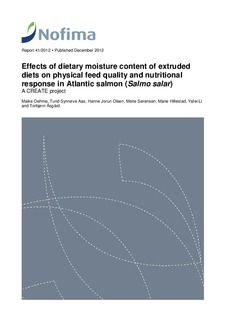| dc.description.abstract | Feed pellets in modern aquaculture must be of high physical quality to withstand impacts during transport, storage and feeding. However, physical quality of feed has been shown to affect feed intake, nutrient digestibility as well as disintegration of pellets in the stomach of rainbow trout. Drying procedure, which varies in commercial feed production, predicts moisture content of feed, but also affects the physical feed quality. In the present study, different feed qualities were produced by drying to different moisture content. Effects on feed intake, nutrient digestibility and growth performance in Atlantic salmon were investigated. Four commercial-like high energy extruded diets of identical nutrient composition on a dry matter basis were produced. Different drying times were employed to achieve four diets with dry matter contents of 95.9%, 94.1%, 92.3%, 90.8%. A fifth diet containing 70% dry matter was made by soaking pellets from one of the dry diets in sea water for 2 hour. Triplicate groups of Atlantic salmon with an initial weight of 961 ± 12.1 g (mean ± SEM, N=240) were fed ad libitum for 91 days, and 7 days with restricted feeding to obtain equal feed intake in all tanks. The results showed that feed intake in fish fed ad libitum was affected by soaking but not by drying procedure of the diets. The diets differed significantly in dry matter, bulk density, DORIS durability and hardness. None of these measurements correlated with feed intake or growth. Long term water stability of the diets was not affected by drying time and soaking, and had a positive linear effect on feed intake and growth. Digestibility of most nutrients was highest in fish fed restricted compared to ad libitum feeding, but was not affected by drying duration. Starch digestibility was slightly reduced for the soaked diet compared to the corresponding dry diet. Pellet integrity in the gastrointestinal tract was not significantly different among treatments. The positive effect of soaking of feed may be of particular importance when feed intake is low. | |
